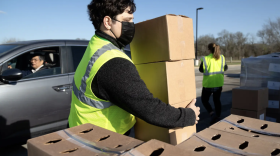Elected officials in Austin decided Thursday to delay a vote on a program that would have sent a monthly stipend to low-income families — no strings attached.
Council Member Mackenzie Kelly, who represents Far Northwest Austin, first called for a postponement. “There are parts of this item that have raised questions that remain to be answered,” she wrote on an online message board used by council members Wednesday.
Kelly said she wanted to understand how the city’s first guaranteed-income pilot program would be evaluated before taking a vote. City staff have said those details still need to be worked out with a nonprofit the city is hiring to implement the program.
The vote to postpone was unanimous, with Council Member Leslie Pool absent.
Others have raised legal concerns about such a program. Bill Aleshire, an attorney and former Travis County judge, wrote to council members this week advising them that state law may not allow a government to give out public funds in this way.
“Before you spend this money, the Council should either ask for an AG Opinion or file suit for Declaratory Judgment,” he wrote. “Otherwise, it will be inhumane to offer the poor people this money and spark their expectation, only to have the money stopped (if not refunded) if a court rules it is illegal.”
Council members met with city attorneys in a closed session Thursday afternoon to discuss the program.
The item, which has been moved to May 5, asks council to approve a contract with the nonprofit to oversee the pilot program. Guaranteed-income programs, also called basic-income programs, provide people with one-time or regular stipends; unlike other social services, though, a guaranteed-income program does not stipulate how families are allowed to spend that money.
“To have a program where you’re actually going to the family and saying, ‘Heck, you might know better than we do,’ is not how government programs are often run,” Mayor Steve Adler, who supports the program, said Monday.
Council initially set aside nearly $1.2 million for a program during budget discussions last summer. From that pot, the city has proposed sending $1,000 a month to 85 low-income families for a year. During that year, city staff said, the Urban Institute, a think tank based in Washington, D.C., would study the effects on the people receiving the money. City staff and elected officials would then decide whether to establish a more permanent program.
The delayed vote comes as the price of housing has skyrocketed in Austin, leading to an affordability crisis. On Thursday, the National Low-Income Coalition published an annual report on affordable housing across the U.S.; Austin ranked among the top 10 cities with the fewest rental homes available for people considered very low-income.
“We are in a housing crisis ... we all know this. We know that the dollars from these programs are needed to help families now,” Council Member Vanessa Fuentes said after Kelly proposed the council postpone the vote for several additional weeks. That amendment ultimately failed.
The nonprofit the city picked to oversee the program, California-based UpTogether, recently completed a privately funded basic-income pilot program, distributing $1,000 a month to 125 families in Austin and Georgetown. According to a report published three months into the program, 95% of families said they planned to spend the money on immediate needs such as bills and food.























